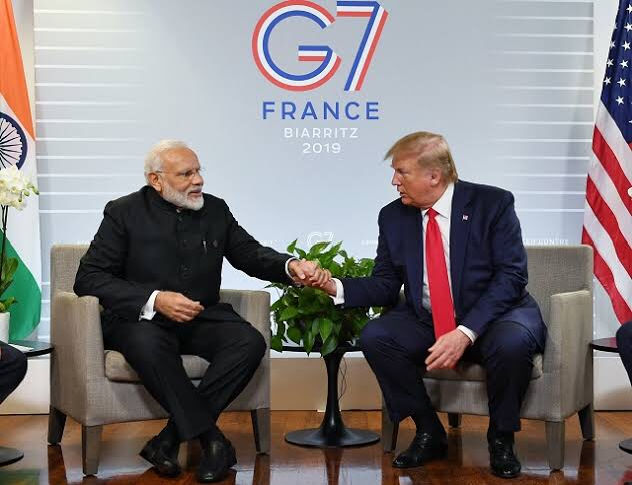US President Donald Trump has backed off from his earlier proposal to mediate on the Kashmir issue. He expressed confidence in Prime Minister Narendra Modi, who assured the US president on the sidelines of the G7 Summit at Biarritz, France, that India will be able to handle the situation without mediation by a third party.
Trump’s latest stand must have come as a rude shock to Pakistan. Prime Minister Imran Khan had gone to the extent of issuing a nuclear threat over the scenario that has emerged in the wake of the abrogation of Article 370 in Kashmir. Pakistan had been trying to build a narrative in its favour over the Kashmir issue.
It was also expecting Trump to mediate. But the volatile American leader has again let Pakistan down as has been his wont on many an issue. The stand that the Indian prime minister has taken on Kashmir can be appreciated to the extent that at the end of the day it is India and Pakistan who will have to find a solution to their differences. No other country can resolve the issue unless the two nations in conflict so decide.
Currently, all major international disputes that exist around the world have seen status quo despite attempts by friendly nations to intervene. The Israel-Palestine conflict rages on despite decades of strife and efforts of powerful Western powers to mediate. Whenever peace has appeared to have a chance, it has been because peoples on both sides have backed the leadership’s decision to de-escalate hostilities. The case of both, North and South, Koreas is no different. The same is the case with foreign intervention in Afghanistan or in Iraq and Libya.
India and Pakistan today are at a position where the peoples of both nations are fed up with the loss of lives over the territorial dispute. In the past three decades since 1989, more than half a lakh people have died in terrorism-related incidents, if recorded statistics are anything to go by. Of course, the death by road mishaps is way beyond this paltry figure of terror related deaths.
The collateral damages due to terror attacks, however, are even higher. It can be stated without being guilty of exaggeration that the state forces also are known to have eliminated many people and there would have been human rights abuses galore that led to more deaths that did not come in the records and become part of the figures. Pakistan too has its own tally of lives lost to the conflict. But for a country that has regularly disowned the very people it trained to perpetrate violence in India, it is but natural for it to swallow its own bitter pill. The Kashmir dispute will have to be addressed through development and not through militarisation.
Similarly, buying off all apples for one season may not suffice to lighten the load of economic burden of that state.
Successive governments in the country have tried to keep the Valley calm through pacifist means, trying to keep the separatist elements and political leadership in the state happy. The incumbent government has broken that old unsuccessful pattern. However, the fresh approach, too, is fraught with pitfalls and unlikely to succeed unless India and Pakistan both behave rationally and help the people of Kashmir into a better future. The Prime Minister now has a huge responsibility on his shoulders. He will have to deliver on the promise he has made. Eyewash politics will not be able to earn the ruling dispensation the trust of the people of Kashmir.
It also cannot hope to achieve the feat by militarisation of the territory, which now stands divided into two Union Territories. The support that Pakistan is receiving from China is another worrying aspect. Finally it will be China that India has to face, not a puny Pakistan. Modi’s chutzpah that his government can resolve the Kashmir issue is welcome. But past experiences with wrongly executed decisions and reverting to the old ways of suppression inspire little hope that the promises will be realised.
